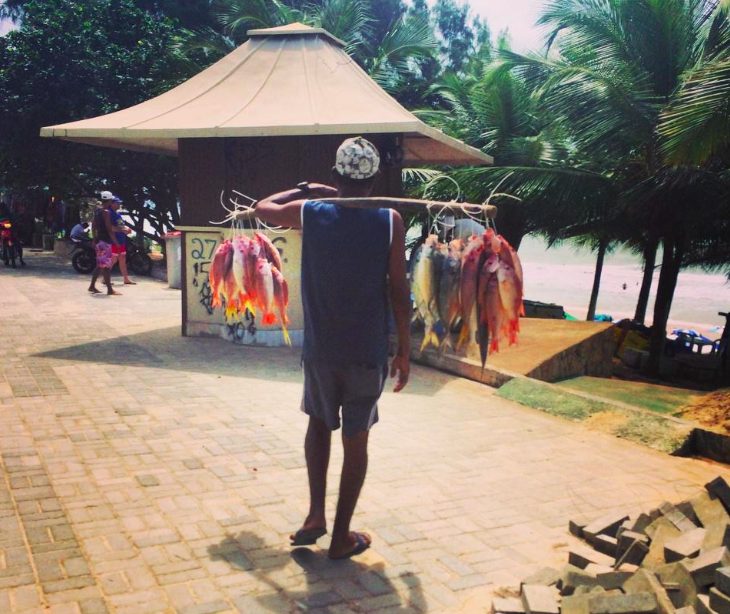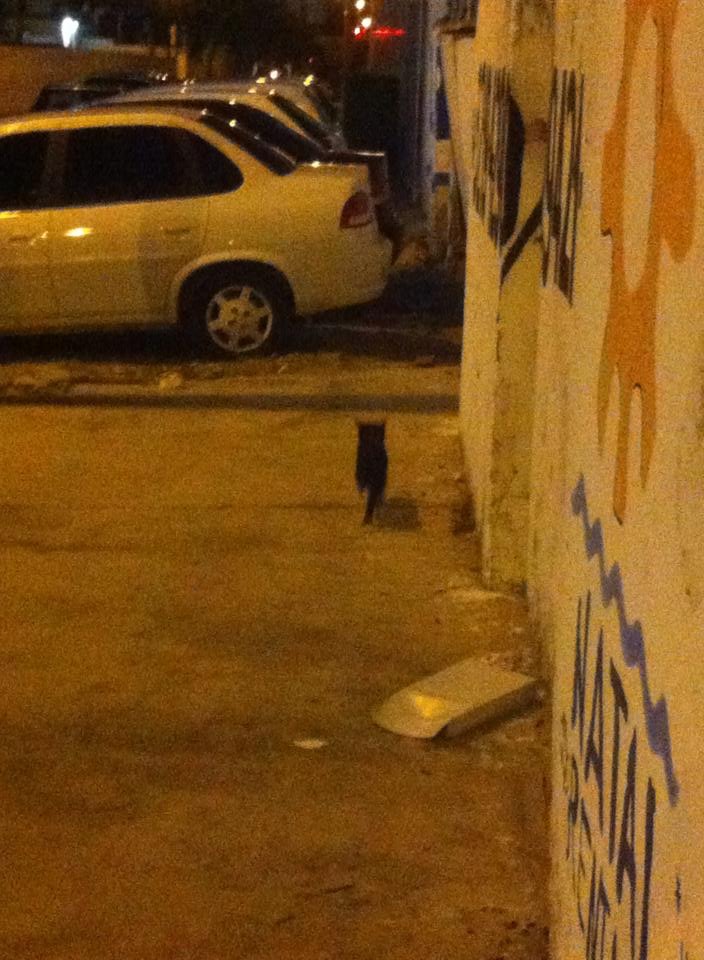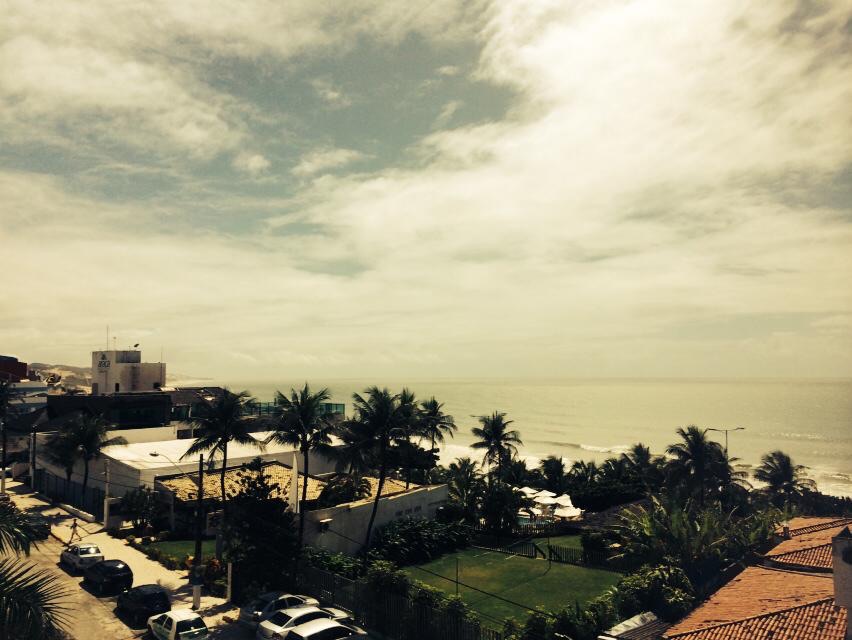 Literary Cities
Literary Cities
Literary Oxford
This is a literary postcard from Oxford, by Rebecca Slater. I came to Oxford to write. I tell myself this most mornings, particularly these dark ...
Read MoreBrendan Zietsch sends a Literary Postcard from Brazil's cultural cradle.
Obscure, impoverished, difficult to get to for almost everyone in the field — it was certainly a strange place for a scientific conference. And though it’s in many ways a paradise, Natal scared me and nearly derailed my novel.

The city sits on the tip of Brazil’s nose, poking out into the Atlantic at a latitude of six degrees south, where the water stays bathlike all year round. The palms lean out over fluffy sand, people laze around sipping booze from coconut husks or they frolic in the friendly waves. You just want to spread your arms, tip your face to the sun, and smile forever. That’s if you’re well-off, of course. Otherwise, you’re trudging up and down the beach for hours, day-in day-out, competing to sell coconut drinks to tourists, or rent us umbrellas or deckchairs or whatever else we might wish for. There are armies of these merchants: leather-skinned, insistent, tireless. And among them are more nefarious types, too, scanning for lumps under deserted towels, or worse: Wikitravel warns that at Ponta Negra beach, where I was staying, armed assaults aren’t uncommon even in the middle of the day.
I had read these warnings before leaving the serenity of my life in Brisbane, and they may have contributed to my perceiving Natal’s poverty as angry — mean — rather than resigned, like other poor places I’d been. I sensed it from the moment I stepped off the plane at 2 a.m., the threat all around me. I’d been warned about airport muggings, so I wore my backpack as a frontpack and narrowed my eyes at passersby, alive to their sinister aspects and motives. I’d been warned about fake taxis, too, run by gangs and robbers; but, not knowing what kind of fakery to look for, I cringed into the first one along. The driver nodded at my Airbnb printout without seeming to read it, and pulled away in silence. The ride, which should have been fifteen minutes, stretched past twenty. I grew tense. It went past thirty. Past forty, then fifty. This was not due to traffic. There was no traffic, it was 3 a.m. We rolled through neighbourhoods increasingly decrepit and shadowy. At some point there was so little light outside that I could only see my own scared face in the window. It was obvious what would happen, in vague terms. With adrenalised clarity I formulated plans in case I was left alive.
But then streetlights appeared, the roads became smoother — and finally we were in the city and pulling up to my apartment’s tower, where the driver came to life and helped with what would have otherwise been an intractable situation with the building’s monolingual night guard. I waved as the car drove away, staring after it.
Up in the flat, dazed by nerves and thirty-five hours awake, I logged into wi-fi and ascertained that in fact I’d flown in to a new airport, an hour out of town — the one fifteen minutes away had shut down a few weeks prior.
So… a totally routine trip, then.
I tried to savour the safety of the bed, the cool pillow on my temple, but my fear, so recent, now seemed absurd, not real at all, as if I’d just been playing along with a practical joke. An hour earlier I’d thought I might die; now I was just annoyed I couldn’t sleep.
Out and about the next day, I tried not to be disturbed by the signs of deprivation. Yes, they looked spooky, those abandoned half-finished high-rises, empty concrete frames with no external walls, but I’d been spooked by the taxi ride too, and see how harmless that turned out. Wait, what? There were people up there! They were working on the building, in plain clothes, with no scaffolding or safety equipment or cranes, or anything I considered essential for tower-making. Some of them were kids. As I walked on, still wincing up at the scene, my footing came unstuck and I nearly fell down an enormous hole in the sidewalk. Or, it was more of a crevasse, really, where the path had collapsed into the adjacent ditch. I peered down. It was big enough to swallow a person whole. At the bottom, five dirty cats were feasting on something I didn’t care to investigate. The littlest one looked up at me.

I decided to quickly find some bottled water (the tap water was poisonous) and return to the safety of the apartment until my colleague-friends arrived. I did find water, eventually, in an unlit garage decked out with consumables — and I managed to purchase some, too, after a long and mutually incomprehensible exchange with the woman in attendance. (It transpired that I for some reason had to take a bottle from the back of a nearby truck, rather than one from the shop’s floor.) By that point I’d ventured quite far, and retracing my aimless steps to the shop proved difficult. The streets seemed more derelict than before. Had I come up this road, or…? I’d started to feel quite lost and fretful when I heard a commotion behind me. A man sprinted past, closely followed by another who was aiming hunks of concrete at him with what sounded (the screaming, that is) like genuinely murderous fury. As they pounded down the road, the pursuer kept swooping more ammunition from the broken edge of the footpath, his shrieks fading as they rounded the next corner.
Well, I walked faster then, and at last, with slump-shouldered relief, I made it back to my apartment sanctuary. I stood on its balcony overlooking the city — the war zone high-rises, the overgrown playground with rusted swing set — convinced now that life here was different. It was perilous, precarious. But then, from the front balcony, it was gorgeous, too. The ocean was right there, shimmering. Calling me. I wasn’t going anywhere, though, until the others arrived, which was still hours away. I pulled out the draft of my novel and flopped with it onto the couch. I’d begun reviewing it on the plane and had been pleased with what I read. Delicately observed, amusing, I thought. I took up where I left off.
My brow lowered, sinking gradually into a full-blown frown. What is this? Why all this focus on language, and on trivial feelings and details? Then, above all that, this preoccupation with meaning? Blah, blah, what does it all mean?… The people here are trying to survive! There’s meaning for you!

I tossed the thing aside and put my palms in my eye sockets. Years, I’d been working on this bullshit, spending hours on each paragraph, getting the sentences just so, perfecting their cadence and connotations. Even the act of writing seemed pointless now, let alone the trivialities I was writing about.
The light outside was browning slightly. I logged into wi-fi and got a message: the others had arrived at the airport. One of them had his laptop stolen at a layover in Sao Paulo. I warned of the hour-long taxi ride and then I fell asleep. It was 5 a.m. in Brisbane.
The rest of the stay was fine. The air of danger didn’t go away — one night out our only toilet option was against a wall in a nearby alley, and our drinks vendor (a jolly man whose tight pink singlet only covered half of his distended belly) insisted on escorting us each time and standing guard while we did our business — but I got used to it, and after a few days it wasn’t the external dangers that preoccupied me, but the interpersonal tensions and intrigues among us conference attendees. That is, the kind of subjects in my novel. Was it the real stuff of life after all? Did Natalenses spend their time thinking about who likes whom, and the meaning of it all? I didn’t have the language (or social) skills to find out. Different for everyone, I suppose. It’s all I can write about, though, because it’s all I know.
I picked up my draft again on the flight home. It still seemed effete and enculturated, but there were sparks of charm. Some of the sentences were great, and I felt glad I’d spent so long on them. I decided to leave it aside for a while, come back to it with fresh eyes later. By the time I did, the world of Natal was distant and unreal — I didn’t even consider it. For better or worse, the world of my book was the world of my life. Was it interesting, worthy of people’s time and attention? Well… hmm. Maybe, with some more work. More time with the sentences, more acute observations, more vivid details. More truth.
So that’s what I’ve been doing: working on it. And I like the work. Well, actually it’s painful most of the time, but we lucky enough to lead boring lives have to make our own meaning, which usually involves something unnecessary and difficult. Some people go hardcore and have kids. For me it’s been finishing this novel.

Brendan Zietsch has stories appearing or forthcoming in Beechwood Review, Bookends Review, and Jellyfish Review, and has published articles about orgasms and romantic preferences in various international academic and media outlets. He lives alone in Brisbane, Australia, loves music, and is polishing a novel.
 Literary Cities
Literary Cities
This is a literary postcard from Oxford, by Rebecca Slater. I came to Oxford to write. I tell myself this most mornings, particularly these dark ...
Read More Literary Cities
Literary Cities
Claire Rosslyn Wilson, on the beauty in the burning fires of Valencia, Spain The smoke is there the next day, caught up in the threads of clothes ...
Read More Literary Cities
Literary Cities
This is a Literary Cities postcard from Karratha, by Megan Hippler. When my employer in San Francisco sent me to Karratha for a month, the ...
Read More